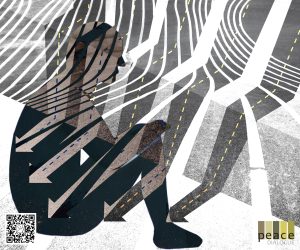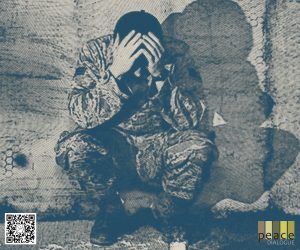PUBLICATIONS

Is Armenia’s Path to ICC Accountability Threatened by the Draft Peace Agreement with Azerbaijan?
This paper examines Armenia’s accession to the ICC amid evolving peace negotiations with Azerbaijan. It explores the legal and political obstacles to accountability and proposes alternative mechanisms for promoting justice and sustainable peace in the region.

Building a Resilient Security Sector: A Roadmap for Transparent, Inclusive, and Accountable Defense Reforms in Armenia

THROUGH DEMOCRACY TO LASTING PEACE: PEACE DIALOGUE NGO’S ANNUAL REVIEW | 2023 – 2024
PEACE DIALOGUE: ANNUAL REVIEW | 2021 – 2022

The ongoing conflict in Ukraine, escalated tensions around the Nagorno-Karabakh region, and rising tensions between Armenia and Azerbaijan have confirmed for many people the well-known notion of “might makes right.” This approach legitimizes the inevitability of violence and “the right of the strongest” while casting doubt on the possibility of peaceful conflict resolution.
However, at Peace Dialogue, we believe that peaceful and democratic societies are possible, and we remain committed to our mission of fostering the protection of human rights, promoting multi-layered dialogue, and building democracy and democratic institutions in conflict-affected and post-conflict societies, both locally and internationally.
Methodological Guide: Eight Simple Tools for Dealing with Difficult Conflicts

We are pleased to announce the release of our new methodological guide, “Eight Simple Tools for Dealing with Difficult Conflicts”. Developed by Peace Dialogue NGO, this manual is based on the methodology used in the series of “Alternative Mechanisms for Conflict Resolution” courses, which took place from October 13 to November 27, 2022. The aim of the course was to enhance conflict resolution skills among the youth in the northern regions of Armenia by fostering a constructive approach and developing their capacity to find realistic and rational solutions to conflict situations on a daily basis.
Analysis of Interviews Aimed at Identifying and Addressing Human Rights Issues in Armenian Military Forces

The research aims to reveal the servicemen’s attitude towards military service, military staff, and fellow servicemen, as well as find out the manifestations of the most common human rights violations in the armed forces, opinions about the law enforcement agencies in the military sector, the reasons for those, and the effectiveness of particular institutions inlaid in the army. The collection, systematization, and analysis of data on the listed phenomena are aimed at creating an informational basis for solving various problems in the armed forces or, at least, for assisting further, more targeted, and in-depth research in this direction (including those conducted by the government agencies of the defense sector).
Peacebuilding?! Perspectives of Armenian and Azerbaijani Peace Practitioners

In this publication we would like to reflect on the situation of peacebuilders in Armenia and Azerbaijan and to show the local voices on the ground. Finalizing this project, we did not find answers to all our doubts and questions, but by sharing our experience we hope to highlight some crucial points, that contribute to the efforts for peace building in the region. Throughout the text, the “CONTACT” initiatives will be introduced in small textboxes to provide some insight into the work “on the ground”.
The EU would prefer a policy of complementarity and ‘supplementarity’ to a new confrontation with Russia

The second Armenian-Azerbaijani large-scale military confrontation – the 44-day war of 2020, as well as the events preceding it and continuing to this day – not only irreversibly transformed the geopolitical picture of the South Caucasus, but also created favorable conditions and became an incentive for the rearrangement of extra-regional power centers and sometimes unpredictable developments. Does the EU intend to reconsider its actions or approaches related to the South Caucasus after the establishment of a new status quo following the 44-day armed confrontation?
Outcomes of Peace Dialogue’s Activities in 2021 in Numbers

In 2021, the post-war reality in Armenia required more efforts to deal with the war consequences and democracy-related challenges that emerged dramatically in the context of abrupt and occurring social-political developments in the country.
Since 2020, Peace Dialogue is making its best efforts to develop new concepts aimed at fostering human rights protection, advocating for victims of the conflict, and regaining mutual trust and potential of future dialogue between citizens of the societies that have been divided by war.
Below, you can find the outcomes of Peace Dialogue’s activities for the year of 2021.
Defense Sector-Related Actions in the Scope of 2020-2022 Action Plan Derived from Armenia’s National Strategy for Human Rights Protection: Monitoring Report

Within the framework of the monitoring, Peace Dialogue NGO focused specifically on monitoring the implementation of human rights protection activities in the Armed Forces, in particular, the actions concerning the right to life in the armed forces, the prohibition of torture, the right to a fair trial, as well as activities related to women’s rights in the context of the equality and prohibition of discrimination. This report is based on the results of the monitoring of the implementation of defense sector-related actions in the period from January 1, 2020 to May 31, 2021.





